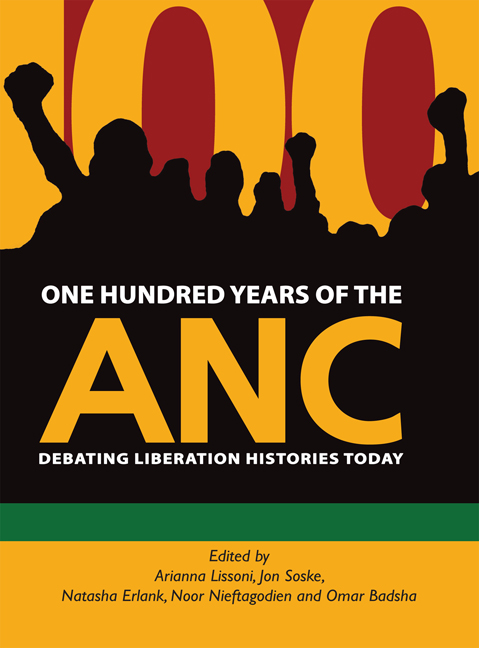Book contents
- Frontmatter
- Contents
- Acknowledgements
- Editorial Note
- FIRST KEYNOTE ADDRESS: Fragmentation and Cohesion in the ANC: The First 70 Years
- SECOND KEYNOTE ADDRESS: A Continuing Search for Identity: Carrying the Burden of History
- Chapter One One Hundred Years of the ANC: Debating Struggle History After Apartheid
- Chapter Two Religion And Resistance In Natal, 1900–1910
- Chapter Three Christianity and African Nationalism in South Africa in the First Half of the Twentieth Century
- Chapter Four Charlotte Maxeke: A Celebrated and Neglected Figure in History
- Chapter Five Imagining the Patriotic Worker: The Idea of ‘Decent Work’ in the ANC's Political Discourse
- Chapter Six Popular Movements, Contentious Spaces and the ANC, 1943–1956
- Chapter Seven Unravelling the 1947 ‘Doctors’ Pact’: Race, Metonymy and the Evasions of Nationalist History
- Chapter Eight The Politics of Language and Chief Albert Luthuli's funeral, 30 July 1967
- Chapter Nine Robben Island University Revisited
- Chapter Ten Shishita: A Crisis in the ANC in Exile in Zambia, 1980–811
- Chapter Eleven Comrade Mzwai
- Chapter Twelve Revisiting Sekhukhuneland: Trajectories of Former UDF Activists in Post-Apartheid South Africa
- Chapter Thirteen Regeneration of ANC Political Power, from the 1994 Electoral Victory to the 2012 Centenary
- Chapter Fourteen The ANC: Party Vanguard of the Black Middle Class?
- Chapter Fifteen Globalisation, Recolonisation and the Paradox of Liberation in Southern Africa
- Contributors
- Index
Chapter Fifteen - Globalisation, Recolonisation and the Paradox of Liberation in Southern Africa
Published online by Cambridge University Press: 21 April 2018
- Frontmatter
- Contents
- Acknowledgements
- Editorial Note
- FIRST KEYNOTE ADDRESS: Fragmentation and Cohesion in the ANC: The First 70 Years
- SECOND KEYNOTE ADDRESS: A Continuing Search for Identity: Carrying the Burden of History
- Chapter One One Hundred Years of the ANC: Debating Struggle History After Apartheid
- Chapter Two Religion And Resistance In Natal, 1900–1910
- Chapter Three Christianity and African Nationalism in South Africa in the First Half of the Twentieth Century
- Chapter Four Charlotte Maxeke: A Celebrated and Neglected Figure in History
- Chapter Five Imagining the Patriotic Worker: The Idea of ‘Decent Work’ in the ANC's Political Discourse
- Chapter Six Popular Movements, Contentious Spaces and the ANC, 1943–1956
- Chapter Seven Unravelling the 1947 ‘Doctors’ Pact’: Race, Metonymy and the Evasions of Nationalist History
- Chapter Eight The Politics of Language and Chief Albert Luthuli's funeral, 30 July 1967
- Chapter Nine Robben Island University Revisited
- Chapter Ten Shishita: A Crisis in the ANC in Exile in Zambia, 1980–811
- Chapter Eleven Comrade Mzwai
- Chapter Twelve Revisiting Sekhukhuneland: Trajectories of Former UDF Activists in Post-Apartheid South Africa
- Chapter Thirteen Regeneration of ANC Political Power, from the 1994 Electoral Victory to the 2012 Centenary
- Chapter Fourteen The ANC: Party Vanguard of the Black Middle Class?
- Chapter Fifteen Globalisation, Recolonisation and the Paradox of Liberation in Southern Africa
- Contributors
- Index
Summary
Several preliminary points should be made in order to better anchor the overall argument presented in this chapter. A first point refers to the notion of ‘globalisation’ itself, for this is a concept that must be demystified. It refers, of course, to all the ways in which the world has become, to put it simply, smaller in recent decades through, for example, the most dramatic of technological changes: from Skype to the BlackBerry and the like. But most fundamentally, the word speaks to the overbearing nature of our novel global economic relations (and, related to that, our global political relations). Increasingly, what we have – to a crucially important degree and in place of the nationally-premised, western-cited, ‘empires’ that Africa came to know too well – is something new: an ‘Empire of Capital’ that, through its supranational agencies (like the World Bank and the International Monetary Fund) and its intermediaries (the state elites of both capitalist countries at the ‘centre’ of the system and of states elsewhere, such as in South Africa), works actively to guarantee the (relative) stability of the overall system.
Note carefully what this means. For, as I will argue, this is a very different empire from that produced by the overbearingly nationally-premised western imperialisms that preceded it. Consider, in this regard, the ambiguities of the ‘liberation’ that has come to define the essence of southern African aspiration in recent decades. There has been a crippling narrowing of the definition of liberation – from one that, in the 1960s and 1970s, saw it as heralding advance on the fronts of race, class and gender equality and of the achievement of a genuine democratic voice from below to one which has come, primarily, to see ‘liberation’ as being defined in terms of racial and national advance only. Of this reality, the most notable critique was that advanced by Frantz Fanon in the 1950s and 1960s. For he saw what had come to pass for ‘liberation’ in Africa as not so much ‘decolonisation’ but rather as a ‘false decolonisation’:
The national middle class discovers its historic mission: that of intermediary. Seen through its eyes, its mission has nothing to do with transforming the nation; it consists, prosaically, of being the transmission lines between the nation and a capitalism, rampant though camouflaged, which today puts on the masque of neo-colonialism.
- Type
- Chapter
- Information
- One Hundred Years of the ANCDebating Liberation Histories Today, pp. 347 - 366Publisher: Wits University PressPrint publication year: 2012



